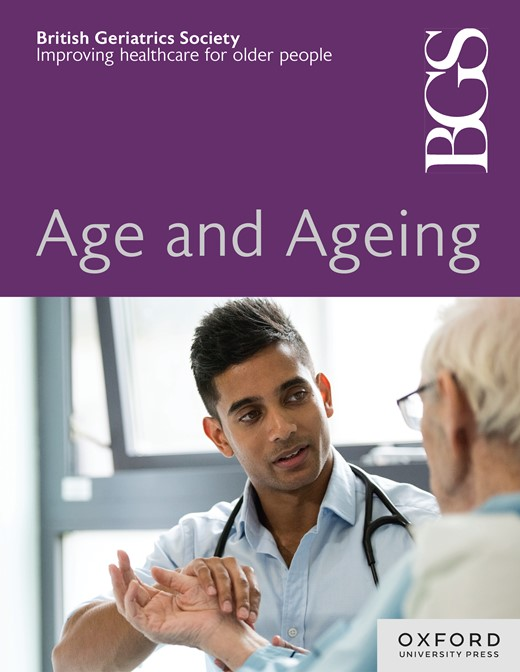Development of a core outcome set for clinical trials targeting interventions aiming to improve adherence to appropriate polypharmacy in older people—an international consensus study
IF 7.1
2区 医学
Q1 GERIATRICS & GERONTOLOGY
引用次数: 0
Abstract
Background Medication non-adherence is prevalent in older people taking polypharmacy. Several interventions have been employed to improve adherence in this population. However, inconsistencies in outcomes have impeded comparisons of findings. Accordingly, this work aimed to develop a core outcome set (COS) for use in trials aiming to improve adherence to appropriate polypharmacy in older people. Methods A group of stakeholders, including academics, journal editors, healthcare professionals (HCPs) and public participants, evaluated 13 outcomes compiled from the literature in a Delphi study using a nine-point Likert scale ranging from 1 to 9, where higher scores (7–9) indicated critical importance and lower scores (1–3) unimportance. The resultant Delphi consensus list was discussed and voted on (yes: critical and no: unimportant) in two online nominal group technique (NGT) meetings. The NGT followed a five-stage approach: introduction, silent generation, round-robin, clarification and voting. An outcome was included if ≥80% of participants scored it critical and ≤ 15% scored it as unimportant. Results Of the 13 outcomes originally presented to participants, consensus was achieved to include six outcomes in the COS after the Delphi study (Round 1, n = 57; Round 2, n = 53; Round 3, n = 50, where ‘n’ represents participant numbers) and the NGT meetings (n = 10) comprising medication adherence across multiple medications, treatment burden, health-related quality of life (HRQoL), healthcare utilisation (HCU), adverse events and side effects (AEs and SEs) and cost-effectiveness. Conclusion This COS should be used in intervention studies focusing on improving adherence to appropriate polypharmacy in older people. Future work should identify outcome measurement instruments to be used alongside the COS.为旨在提高老年人适当多药依从性的干预措施制定临床试验的核心结果集——一项国际共识研究
背景 在服用多种药物的老年人中,不坚持用药的现象十分普遍。为改善这一人群的用药依从性,已采取了多种干预措施。然而,结果的不一致性阻碍了研究结果的比较。因此,这项工作旨在开发一套核心结果(COS),用于旨在提高老年人适当服用多种药物依从性的试验。方法 包括学者、期刊编辑、医疗保健专业人员 (HCP) 和公众参与者在内的一组利益相关者在德尔菲研究中使用 1 到 9 分的李克特量表评估了从文献中收集的 13 项结果,其中较高的分数(7-9 分)表示至关重要,较低的分数(1-3 分)表示不重要。在两次在线名义小组技术(NGT)会议上,对得出的德尔菲共识清单进行了讨论和表决("是":至关重要,"否":不重要)。NGT 遵循五个阶段的方法:介绍、无声生成、循环、澄清和投票。如果≥80%的参与者认为某项结果至关重要,而≤15%的参与者认为该结果不重要,则该结果将被纳入其中。结果 在最初提交给参与者的 13 项结果中,经过德尔菲研究(第 1 轮,n = 57;第 2 轮,n = 53;第 3 轮,n = 50,其中 "n "代表参与者人数)和 NGT 会议(n = 10)达成共识,将 6 项结果纳入 COS,包括多种药物的用药依从性、治疗负担、健康相关生活质量 (HRQoL)、医疗保健利用率 (HCU)、不良事件和副作用 (AEs 和 SEs) 以及成本效益。结论 该 COS 应用于干预研究,重点是提高老年人对适当的多种药物治疗的依从性。今后的工作应确定与 COS 同时使用的结果测量工具。
本文章由计算机程序翻译,如有差异,请以英文原文为准。
求助全文
约1分钟内获得全文
求助全文
来源期刊

Age and ageing
医学-老年医学
CiteScore
9.20
自引率
6.00%
发文量
796
审稿时长
4-8 weeks
期刊介绍:
Age and Ageing is an international journal publishing refereed original articles and commissioned reviews on geriatric medicine and gerontology. Its range includes research on ageing and clinical, epidemiological, and psychological aspects of later life.
 求助内容:
求助内容: 应助结果提醒方式:
应助结果提醒方式:


